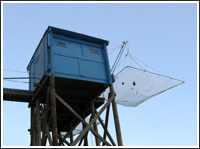 When the fisherman spreads his net on the ground or in the water, the net is stretched out horizontally so that it covers as much space as possible. None of the knots are on top of each other, none are more important than the others. They are not in a position to consider the other knots as rivals, adversaries or enemies. Each knot knows that, as part of a net, it is inextricably linked to the four other knots that surround it; these knots are in turn each linked to four other knots, and they thus grow exponentially to form a net. However, each knot is aware of its own responsibility, based on the link that connects it to the four neighbouring knots and the integrity of the net as a whole. Each knot knows that it is unique, and that the other knots are likewise unique. The unity of the net is founded on the diversity of the knots. When the fisherman thinks about this marvellously simple complexity, he sheds tears of emotion. He feels true love for his net, a product of his own handiwork, a marriage of beauty and efficiency. The net mirrors the marvellously simple complexity the fisherman represents.
When the fisherman spreads his net on the ground or in the water, the net is stretched out horizontally so that it covers as much space as possible. None of the knots are on top of each other, none are more important than the others. They are not in a position to consider the other knots as rivals, adversaries or enemies. Each knot knows that, as part of a net, it is inextricably linked to the four other knots that surround it; these knots are in turn each linked to four other knots, and they thus grow exponentially to form a net. However, each knot is aware of its own responsibility, based on the link that connects it to the four neighbouring knots and the integrity of the net as a whole. Each knot knows that it is unique, and that the other knots are likewise unique. The unity of the net is founded on the diversity of the knots. When the fisherman thinks about this marvellously simple complexity, he sheds tears of emotion. He feels true love for his net, a product of his own handiwork, a marriage of beauty and efficiency. The net mirrors the marvellously simple complexity the fisherman represents.
It also mirrors the solidarity economy, which is more than a simple act of production aimed at survival. It is a way of life. The solidarity economy (oikos = house, nómos = managing) brings us face to face with a challenge: managing and caring for the different dwelling places we inhabit - body, home, community, town, ecosystem, country, planet. The solidarity economy invites all inhabitants to empower themselves in order to become an actor in the development of their individual and collective potential. Economic activity promotes the viability of human and social development. This is the real goal we should be aspiring to, one that is constantly moving, since our potential is infinite! This development can also be defined as the ongoing conquest of an ever greater degree of freedom: the freedom linked to the demands of simple survival, the bonds of work, in slavery or as an employee, the forfeiture of various rights, and the alienation from our obligations as citizens and human beings in a constantly changing universe.
The solidarity economy asserts that no one can empower anyone else and that no one empowers themselves alone. However, in order to achieve empowerment as a person and a social being, everyone needs to be consciously linked to other people, both men and women. If this link is hierarchical and vertical, it becomes a source of domination and alienation. Only a horizontal, non-hierarchical link can lead to emancipation. This horizontal link has another name: democracy. True democracy is like the fisherman’s net: each person is fully responsible for him/herself and for the human community as a whole, in a dynamically harmonious relationship with the environment. Relationships between individuals are based on cooperation, reciprocity, respect for diversity, solidarity, and the establishment of common agreements that respect diversity. The net represents unity in diversity.
Emancipatory education is characterized by the contribution it makes to self-empowerment driven by the recipient, who thus takes on the responsibility of managing his/her own development, both individual and social. Emancipatory education teaches us to always go further. The teacher of emancipation ensures that each student learns to learn without depending on the teacher. This vocation is distinguished by the teacher’s humility in wanting students to reach the point where they can manage without their guide. This is the goal of self-empowerment as driven by the student, on the verge of becoming a traveller who, step by step, is opening up the path for him/herself. But the journey is long and full of dangers and unexpected twists and turns. Emancipatory education teaches us to fear neither risks, nor crises and conflicts. Risk is a natural part of the diversity that is life. Learning to combat it, not as an enemy but as an ally, helps us to grow and progress, ever further, ever higher.
In their humble purity of intent, teachers of emancipation want their students to reach their level, or even surpass it, in the three crucial arts: the art of being, of knowing, and of savoir-faire. A teacher of this kind is providing a loving education. And when this education is used by the solidarity economy, it forges relationships from an economic material that is rich in social, solidarity-based and loving content. And, quite simply, from love is born the ultimate goal of our existence on earth: living life to the full, achieving happiness.
Marcos Arruda
http://www.socioeco.org/en/contact.php
Copyright © 1995, 2000, Jornal do Brasil. The total or partial reproduction of the JB Online contents for commercial purposes is strictly prohibited.


